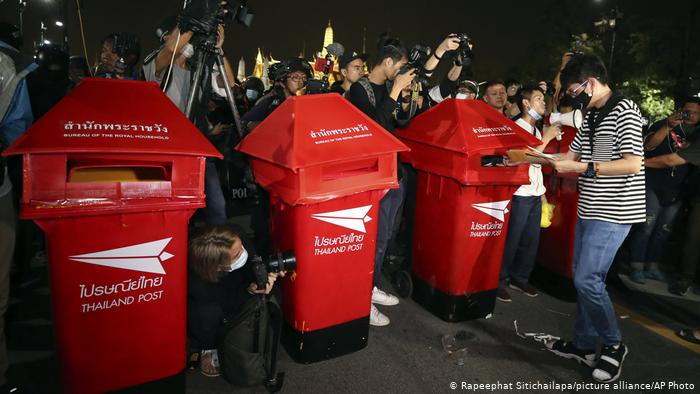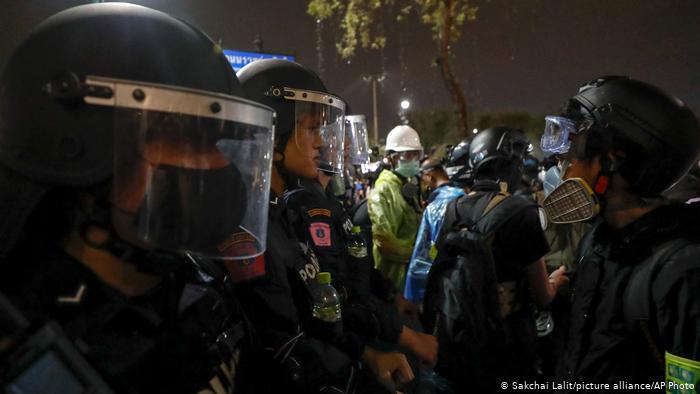The incident is the second occasion in recent months in which police resorted to using water cannons on demonstrators. Recent protests in Thailand have called for government reforms and changes to the powerful monarchy.
Pro-democracy protesters in Thailand were confronted with riot police and water cannons on Sunday as they attempted to deliver grievance letters to the Grand Palace in Bangkok.
The conflict was brief, and police later allowed the demonstrators to place four red mailboxes near the palace to allow protesters to deposit their letters.
Some 7,000 protesters took to the streets on Sunday, marching from Democracy Monument in central Bangkok to the palace, authorities said.

Police had unleashed water cannons when protesters pushed aside one of several buses serving as a barricade to the palace. For protesters and one police officer were hurt during the confrontation, according to the Bangkok authority's emergency unit.
Police spokesman Kissana Phatanacharoen said the water cannons were only fired as a warning. It was only the second time police used the cannons amid months protests.
The Grand Palace in Bangkok is home to royal offices but is only used infrequently by King Maha Vajiralongkorn.
Pro-democracy protests in Thailand
The southeast Asian country has seen pro-democracy protests since July. The student-led movement has put enough pressure on the government to call for parliament to deal with at least some of their demands.
Protesters have taken to the streets on a daily basis to protest the country's monarchy and demand that Thailand's Prime Minister Prayuth Chan-ocha step down.
Protesters believe Prayuth lacks legitimacy because he came to power during an election in which the rules were set up by the military. Prayuth, a former army chief, led a 2014 coup that ousted an elected government and then headed a junta that ran the country until an election last year.
The junta also instituted a new constitution that the protesters deem to be illegitimate.
The movement's criticism of the monarchy is more controversial. A lese majeste law mandates a prison term of up to 15 years for anyone who defames the king or his close family. Public criticism was virtually unheard of until the protests.
The protesters have demanded curbs on the king's powers and called for the monarchy to be more accountable.
"When the king truly cherishes democracy, all people will find happiness," the protesters said Sunday as part of a prepared statement. "When you hear all the flattering praise from the people, you must also hear fearless criticisms and suggestions all the same."
Latest Stories
-
Finance Minister inaugurates SSNIT Board, warns against politically-motivated asset sales
2 minutes -
Ghana’s small-scale gold exports overtake large-scale for the first time – GoldBod CEO
11 minutes -
DigiVibe targets gender-inclusive economic development and digital transformation in Ghana
34 minutes -
BoG targets loan defaulters in new regulatory measures
35 minutes -
Ghana’s 5G rollout is unlocking a new digital era with safe, shared infrastructure
36 minutes -
Goldbod rakes in $1.17bn after first full month – Finance Minister
44 minutes -
Walewale MP to establish state-of-the-art recording studio to boost creative art and fight drug abuse menace
50 minutes -
Ato Forson signs ¥402m grant agreement with Japan to boost human capital development
53 minutes -
Bunkprugu Paramount Chief officially gazetted after 18-year legal battle
58 minutes -
Establish centralise digital platform for taxpayers to file annual financial statements – Deloitte Associate Director to government
59 minutes -
Ongoing drainage projects must be backed by attitudinal changes towards waste – Adjei-Mensah Korsah
1 hour -
Mpox outbreak: 26 new cases confirmed, total cases now 45
1 hour -
OSP is a waste of public funds – Kwabena Agyepong slams handling of Ofori-Atta
1 hour -
Music producer Joseph Appiah to present constitution audio book to Mahama
1 hour -
OSP dismisses purported medical report on Ken Ofori-Atta, denies receiving any official document
2 hours

